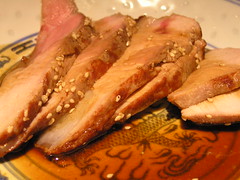 Do you like pork? Do your family members enjoy dinners that include pork? Or, do you have a family member who cannot stand the taste, or the smell, of pork? A new study reveals that the reason has to do with genetics. Certain genes make a person able to smell the meat more intensely than others can.
Do you like pork? Do your family members enjoy dinners that include pork? Or, do you have a family member who cannot stand the taste, or the smell, of pork? A new study reveals that the reason has to do with genetics. Certain genes make a person able to smell the meat more intensely than others can.
Pork has been described in advertisements as “the other white meat”. Many Americans eat pork sausage, pork chops, and pork ribs. We eat pork in tacos, and in rice, and we eat plenty of bacon that is made from pork. Of course, some people choose not to eat pork for religious reasons. Others, however, simply cannot stand the smell of pork. Why?
A study was done by Duke University Medical Center scientists, who were working with colleagues in Norway. The reason for the study had to do with the way pork was currently being sold in Europe, and an upcoming change to that method.
Currently, the pork that is sold in supermarkets comes from female pigs and from male pigs that have been castrated. Europe was considering banning a castration method for pigs, which would mean that the pork sold in supermarkets would also soon come from male pigs who had not been castrated. There was concern that consumers would not like the taste of pork from that group of pigs because of the level of the androstenone hormone it would contain.
There were 23 people in the survey. 13 of them were consumers, and 10 were professional sensory assessors. Researchers added biological levels of androstenone to existing pork meat, up to the limit of what might be found in male wild boars. The researchers gave the people in the study pork that contained androstenone. Some found the smell to be offensive, and others did not.
A genetic study was done. The people who really did not like the smell of the pork that contained androstenone had two functional copies of a gene that linked to an odor receptor that detects this particular hormone. People who had only one functional copy of this gene, or zero functional copies, were unable to detect the smell of androstenone.
The result of the study concluded that there was potential that consumers would not like the pork that came from male pigs who had not been castrated. There is potential that people would buy less pork, or would seek out pork that came from female pigs instead. The study also explains why some people are very picky eaters and cannot stand the smell, or taste, of pork.
Image by Laurel Fan on Flickr

